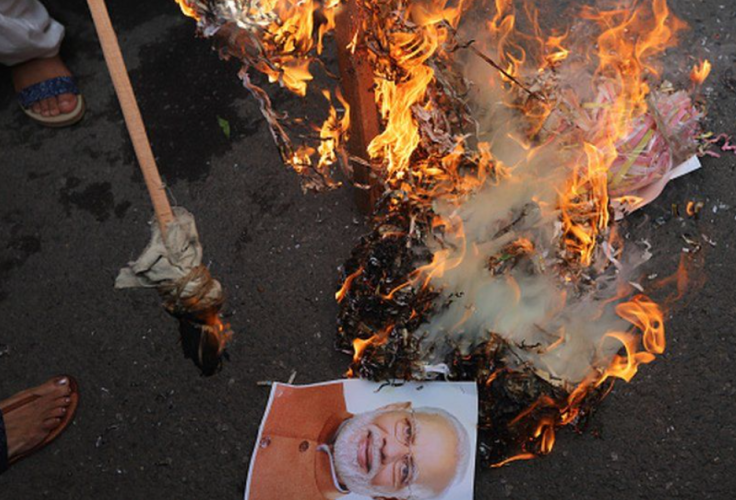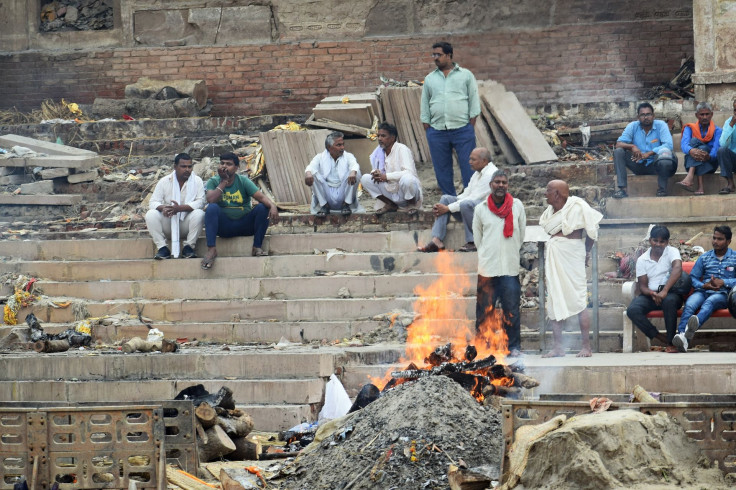Protests are continuing for the fourth day in the Indian capital, Delhi, after a nine-year-old girl, was allegedly gang-raped, murdered, and forcibly cremated. The victim's family has narrated a series of events that has now paved the way for a major outcry from citizens across the country.
The victim, a Dalit girl - formerly untouchables, was forcibly cremated at the crematorium in Delhi’s Nangal area on Sunday, August 1.
The girl's parents made a living by begging outside a Sufi Muslim shrine located just across the crematorium. She was their only child.
On Sunday evening, the girl’s father sent her to fetch some water for her mother. They usually get water from a water cooler installed at the crematorium.
"She said, 'Okay papa, I will get it after playing,'" the father told Newslaundry.
When she didn't return for over an hour, the girl’s mother went searching for her.
"I went in and found my baby lying there, dead," the girl’s mother recalled. "Her lips were torn, her tongue was blue, her eyes would not close, and she had bruises on her left arm. Her shirt and undies were wet. I couldn’t bear to look at her."
The mother said a Hindu priest, identified as Radhe Shyam approached her and told her that her daughter had been electrocuted while she was filling water.
She said three men, who were later identified as the suspects, approached her and told her not to inform the police, saying "they would insist on an autopsy and steal her organs and sell them".
The mother claimed that the priest locked the crematorium gate from the inside. "He told me, 'Don’t shout. Don’t scream. What had to happen has happened. Now, why are you screaming? Let’s finish this.' And then he set my child on fire."
Once the pyre was fully lit, the priest told the woman to go home and "sleep quietly". "Don’t go back crying and screaming. Come back tomorrow at 8 am, take the ashes, and put them in the Yamuna river," the girl’s mother alleged the priest told her.
By then the girl’s father and neighbors were alerted about "an issue" at the crematorium. The father along with about 150 villagers, reached the crematorium and found the gates locked. They noticed a pyre burning inside the crematorium and the four accused men, standing next to it.
"The pyre was burning and my wife looked like she was going to faint," the girl’s father recalled. "I kept asking the pandit what had happened and he kept telling me not to make a big deal of it."
They broke open the gate and went in. Once inside the villagers doused the pyre with water.
The suspects reportedly tried to run away but when they failed to find an escape route the priest finally confessed to raping the girl.
"First he said electrocution had killed her," Nitin, one of the villagers, said. "But when we slapped him around a bit, he begged for forgiveness and said, 'Yes, I made a mistake, please forgive me.'"
Police officers responded to the scene and arrested the four suspects. They were identified as 55-year-old Radhey Shyam, 43-year-old Lakshmi Narayan, 63-year-old Kuldeep, and 49-year-old Salim.
A case of gang rape, murder, and forced cremation had been registered against the accused. However, an autopsy can’t confirm rape as most of the girl’s body parts were already charred and all they could retrieve were her legs, some of her scalp, and a portion of her hip.
"All legal formalities are being followed. The men have been sent in judicial custody for 14 days," Ingit Pratap Singh, deputy commissioner of police, southwest Delhi, told the news outlet.
On Wednesday, hundreds of protesters gathered outside the crematorium demanding death penalty for the accused.
Delhi Chief Minister Arvind Kejriwal and senior leader of the opposition Congress Party Rahul Gandhi visited the girl's family and assured them they would get justice.

The protesters also burnt an effigy of Prime Minister Narendra Modi, accusing him of not condemning the brutal crime.
The heinous incident occurred in the same crematorium where two women were raped in June. Two men from the Indian Army were arrested for their involvement and a probe is still underway.

© 2025 Latin Times. All rights reserved. Do not reproduce without permission.




